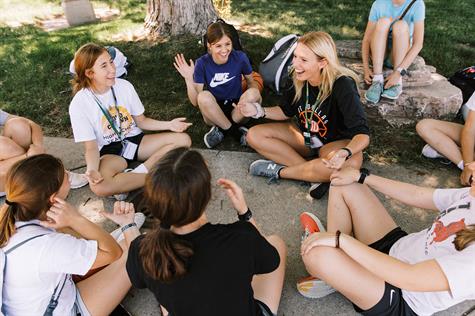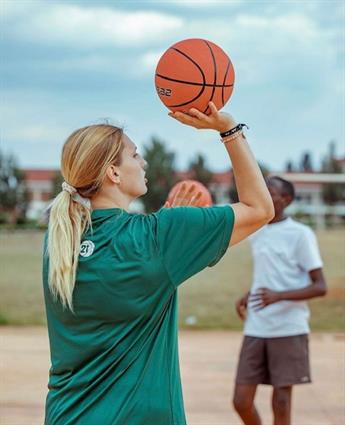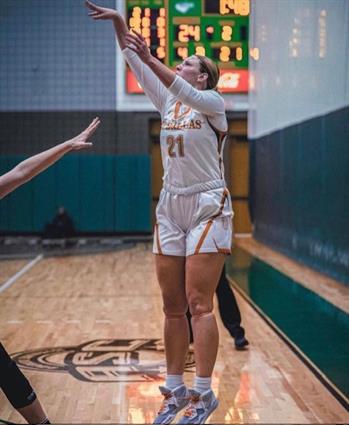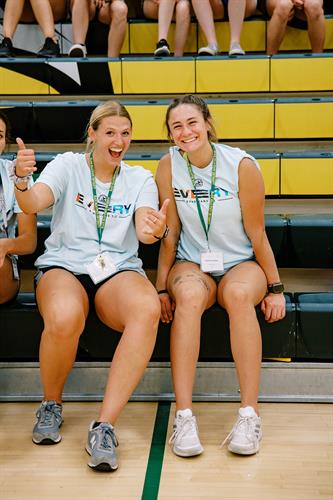Diane Hurst grew up in a Christian home in Lampasas, Texas, but there was a disconnect between knowing God in her head and knowing Him in her heart. Her family was a basketball family: Both parents played college basketball, as did her siblings. As the youngest of three, Hurst held to the thought that basketball was a way of life and she’d follow in her family’s footsteps.
Raised in a military family, her family moved quite a bit, but the one thing that didn’t change wherever she went was basketball.
“It was a way I quickly made friends, my in at every school,” said Hurst.
Hurst saw both the family history with the sport and how she found acceptance in school from her skill on the court as a way to maintain status. She got serious about the game around eighth grade and made it her ambition to go to a Division 1 school.
 The self-placed pressure to measure up in her family drove her as she began her high school career at Lampasas High School.
The self-placed pressure to measure up in her family drove her as she began her high school career at Lampasas High School.
“It was never really an option that I wouldn’t go somewhere to play basketball,” she said. “Everyone was telling me, and I was telling myself, that basketball was my identity.”
Hurst continued to build her own plans and work toward them, but there was no room for God’s voice in her midst.
“These were all the things that I wanted to do for the rest of my life, but I don’t think I ever stopped and asked God what He wanted me to do,” she admitted.
That began to change her sophomore year when Hurst suffered a concussion and was out for some of the season. With her identity wrapped tightly around how she played, she began to spiral when she had to sit out. Frustration built, and Hurst took it out on her teammates, family and friends. She also lost focus on her schoolwork.
One evening in the apex of her struggle, Hurst’s brother mentioned she needed to go to the FCA Huddle on campus with him. A Sunday Christian, she’d go through the motions of faith but didn’t intentionally live it out.
Hurst went with her brother, but, even in a room full of 40 people, she felt alone.
 That’s where God stepped in and met a lonely, identity-lost young woman right where she needed.
That’s where God stepped in and met a lonely, identity-lost young woman right where she needed.
“I felt a peace that didn’t make any sense, and I felt God speaking to me that basketball wasn’t everything,” she shared. “That was shocking because I didn’t know what that meant for my life, but it felt like the Lord was leading me down a different path.”
Hurst wanted to know more about God, so she dove into her church youth group and began being mentored by her youth pastor’s wife, who was a former college athlete. They walked through discerning God’s voice and plan for her life; Hurst still wanted to play basketball, but a Division 1 school no longer seemed necessary. Her faith now took top priority. She landed at Dort University, a private Christian college in Sioux Center, Iowa, and enrolled in classes as she joined the basketball team.
Expectations still followed her to campus, however. Hurst wrestled with measuring herself against playing time and comparing herself to her teammates’ abilities. Hurst’s identity began to spiral again. If she wasn’t playing as a top performer, then who was she?
Hoping to find something to ease the internal discomfort, she found herself in the party scene. COVID-19 shut down her sophomore season and sent her further into a search for meaning.
Back on campus her junior year, Hurst continued her search for identity. She poured herself into a relationship, but when it ended, she turned to managing her body image, friendships—anything that would fulfill her. But it was like pouring water into a hole-drilled bucket: She kept coming up empty.
Panic attacks and depressive episodes followed, and Hurst was helpless, unable to hold too much hope. As her basketball and personal environments became unhealthier, she realized she needed to take a step back and away.
“I knew the life I was living was just not glorifying to God, and I had to do something to stop it,” she admitted.
 Hurst moved back home for a semester, taking online classes and pulling out of the game that she loved. Assaults of guilt plagued her, sent her questioning her athleticism and faith.
Hurst moved back home for a semester, taking online classes and pulling out of the game that she loved. Assaults of guilt plagued her, sent her questioning her athleticism and faith.
“I just felt a lot of disappointment, like, I failed and didn't become the college athlete like I thought I was. And then I got into all these sins that I always said I wasn't going to do and got in a really dark place.”
But God wasn’t done with her. Her church needed an interim youth pastor over the summer, and Hurst was being considered.
“I was like, ‘I’m not equipped, I can’t do this; you don’t know who I’ve been the past two years,’” Hurst told the church.
But God saw something in her, as did the church leaders, and after prayer, the church officially asked her to take the role. As she watched over her old youth group, God watched over her heart and again began to transform her with His love.
Hurst realized God wasn’t done with her, and she had a lot to offer the world. With renewed hope, she prayed and sought guidance for her next season. Basketball still burned in her, but this time, she opened herself up to the Lord’s leading.
One of Hurst’s friends played for the University of Texas – Dallas and told her coach Hurst was looking for a school. Hurst got a phone call with an offer for a spot on the team and a scholarship to help with schooling.
“It was truly a blessing, it just lined up perfectly,” said Hurst. “That’s just God.”
In August of her junior year, she moved to campus with intentions of a fresh start, but she quickly slipped back into the familiar patterns of campus life.
“I didn’t know how to do college well, how to live a godly life in college,” Hurst admitted. But then she remembered FCA and how her time in the high school Huddle helped shape her life. Something clicked, and Hurst decided she needed to get back FCA.
She made some calls to people she knew in Iowa and Nebraska just before the school year ended, inquiring about opportunities in the ministry. She was offered a summer internship with Nebraska FCA, and as soon as she finished her finals, she packed up her car and drove to Lincoln, Nebraska.
It was then that Hurst began to reevaluate the way she played. On an intern training outing, the team played basketball. Hurst was all in on the court, but it was what Lincoln Representative Robbie Trent mentioned post-game that shifted her a great deal.
“He asked us afterward, ‘Did you think about Jesus dying on the cross?’ And I remember saying, ‘We’re playing basketball; that has nothing to do with Jesus dying on the cross.’ Robbie responded, ‘It has everything to do with Jesus dying on the cross.’ It was shocking because no one in my life had ever really talked about combining sports and God together.”
The Philippians 4:13 mentality of being able to do all things through Christ struck deep for Hurst and grew through the summer while at Black Hills Sports Camp in Spearfish, S.D.
“There’s an urgency to share the Gospel,” Hurst said. “God taught me that my stats don’t matter, how I look when I play doesn’t matter, what my friends, teammates, coaches, family think of me doesn’t matter. The only thing that matters is that I’m glorifying God through everything.”
At camp, Hurst shared this newfound truth with a basketball camper who was experiencing similar struggles Hurst faced in her early college days.
“I sat with her one night and allowed her to cry,” she said. “I could feel her pain, and I shared similar parts of my story with her and walked through Scripture with her. I told her God is sovereign and He has helped me through it.”
 After Hurst and the camper walked through a good portion of the book of Job, seeing God’s presence in the hard, the girl gave her life to Christ on the last night of camp.
After Hurst and the camper walked through a good portion of the book of Job, seeing God’s presence in the hard, the girl gave her life to Christ on the last night of camp.
“It’s crazy, because I remember thinking that my story is shameful and I don’t want to share that with anyone—ever, but now God’s using it as a light and to reflect what He has saved me from.”
Last fall, Hurst returned to her Texas campus with an urgency to finish her basketball career with a Kingdom mindset.
“Having someone on my team give her life to Christ is a way bigger win than winning the conference or getting awards,” she said.
She surrendered her playing time and points to God and played with a renewed purpose. It turned out to be Hurst’s best season, not because of stats, but because some of her teammates committed their lives to Christ as Hurst helped walk them through their newfound faith journey.
“Don’t find your identity in your sport,” she advised. “Your sport will fail you. Your friends, family, relationships, whatever you put your worth in, will fail you. But what Jesus did on the cross won’t fail us.”
Hurst decided to stop playing after four year of college. The fifth-year senior may be finished with basketball, but she’s forever grateful for the grace and patience of God as she leaned in to learn what it meant to truly live with a hope that lasts.
“God gave me a second chance, really a third chance, to finally get it right to play for Him.”
Why not invest in the lives of campers and Huddle Leaders like Diane? Visit FCACamps.org and see how you can support a local camp in your area.
-FCA-
Photos courtesy of FCA and Diane Hurst